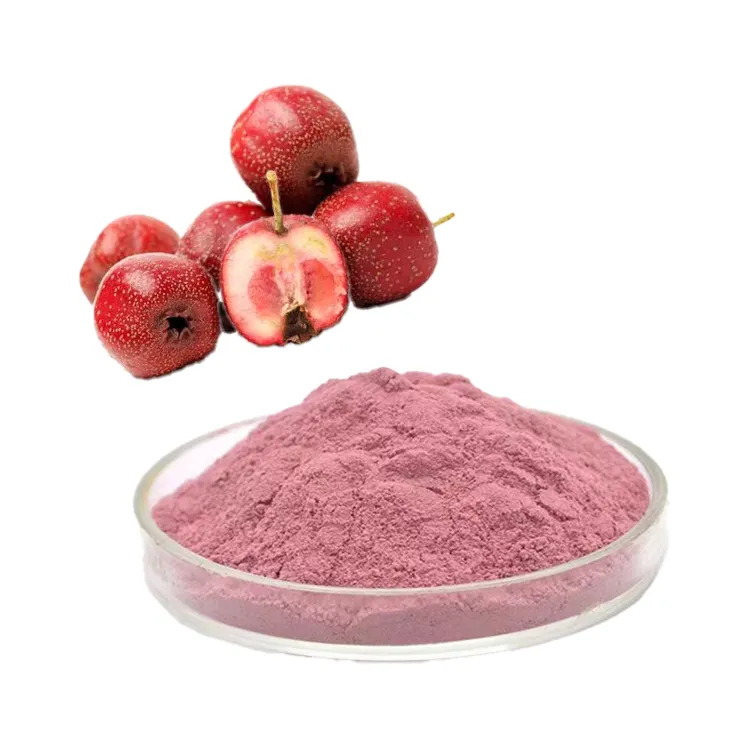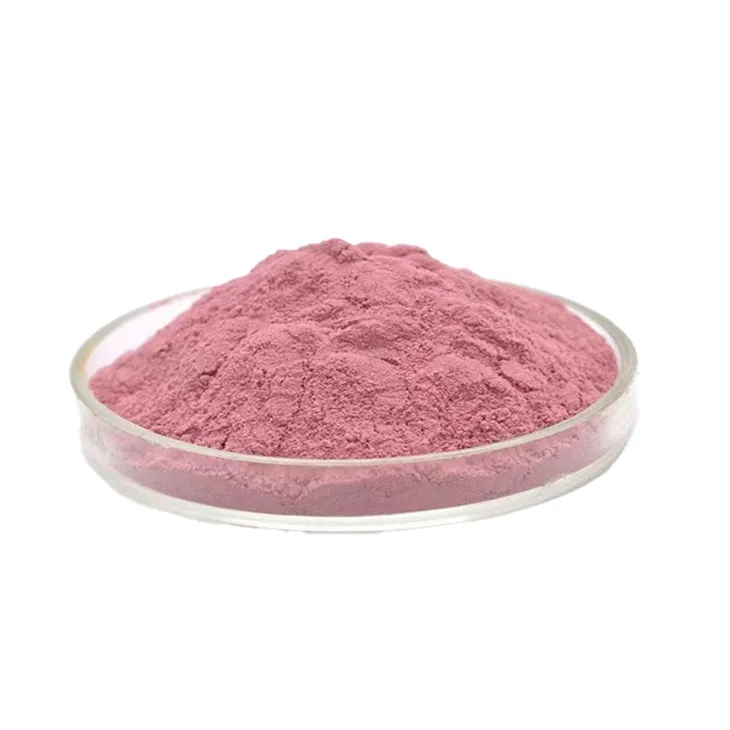- 0086-571-85302990
- sales@greenskybio.com
Optimal Bioavailability of Hawthorn Powder
2024-11-27

Introduction
Hawthorn powder has been recognized for its numerous health benefits, particularly in relation to heart health. It contains a rich variety of beneficial compounds such as flavonoids, procyanidins, and phenolic acids. However, to fully reap these benefits, it is crucial to understand how to optimize its bioavailability. Bioavailability refers to the proportion of a substance that enters the circulation and is able to have an active effect. In this comprehensive guide, we will explore various factors that can enhance the body's utilization of Hawthorn powder.

1. Preparation Methods
1.1 Grinding and Particle Size
The first step in preparing Hawthorn powder is the grinding process. Fine grinding is essential as it can significantly impact bioavailability. When hawthorn berries or dried hawthorn are ground into a fine powder, the surface area available for interaction with digestive enzymes and absorption in the gut increases. A coarser powder may not be digested and absorbed as efficiently. For example, if the particles are too large, they may pass through the digestive system partially undigested, reducing the amount of beneficial compounds that can be absorbed into the bloodstream.
1.2 Solubility
Another aspect of preparation is enhancing the solubility of hawthorn powder. Some methods can be employed to improve solubility. One way is to mix the hawthorn powder with a small amount of warm water and stir thoroughly before consumption. This helps to break down any clumps and exposes more of the powder to the digestive fluids. Additionally, some natural additives like a small amount of honey or lemon juice can be added. Honey not only improves the taste but may also have a positive impact on solubility, while lemon juice can slightly acidify the mixture, which may aid in the dissolution of certain compounds in the hawthorn powder.

2. Consumption with Certain Foods
2.1 Fat - Rich Foods
Consuming hawthorn powder with fat - rich foods can enhance its bioavailability. Fats can act as carriers for the hydrophobic (water - fearing) compounds present in hawthorn powder. For instance, when taken with a spoonful of nut butter (such as almond or peanut butter), the lipids in the nut butter can form micelles with the lipophilic components of the hawthorn powder. This allows for better absorption through the intestinal lining. However, it is important to note that moderation is key when consuming fat - rich foods, as excessive fat intake can have its own negative health implications.
2.2 Probiotic - Rich Foods
Pairing hawthorn powder with probiotic - rich foods is also beneficial. Foods like yogurt, kefir, or fermented vegetables contain live bacteria that can improve gut health. A healthy gut microbiome is essential for optimal absorption of nutrients. The bacteria in probiotic - rich foods can break down complex compounds in hawthorn powder into more easily absorbable forms. For example, they may help in the fermentation of certain polysaccharides present in hawthorn, releasing smaller molecules that can be more readily taken up by the body.

3. Individual Health Conditions
3.1 Digestive Disorders
For individuals with digestive disorders such as irritable bowel syndrome (IBS) or Crohn's disease, the bioavailability of hawthorn powder may be affected. In cases of IBS, the abnormal gut motility and altered digestive enzyme secretion can impact the breakdown and absorption of hawthorn compounds. People with Crohn's disease, which involves inflammation of the digestive tract, may have reduced absorption capacity in the affected areas. In such situations, it may be necessary to adjust the form or dosage of hawthorn powder. For example, a more easily digestible form, such as a liquid extract, may be more suitable for those with severe digestive issues.
3.2 Liver and Kidney Function
The liver and kidneys play important roles in metabolizing and excreting substances, including the compounds from hawthorn powder. If liver function is impaired, the metabolism of certain flavonoids and other active ingredients in hawthorn may be affected. Similarly, in cases of kidney dysfunction, the excretion of metabolites may be altered. Individuals with liver or kidney problems should consult a healthcare professional before consuming hawthorn powder to ensure that it is safe and that the dosage is appropriate for their condition.

4. Timing of Consumption
4.1 Empty Stomach vs. With Meals
Taking hawthorn powder on an empty stomach may lead to faster absorption in some cases. When the stomach is empty, there is less competition for absorption from other food components. However, for some people, taking it on an empty stomach may cause mild gastrointestinal discomfort. Consuming hawthorn powder with meals can slow down the absorption process but may also provide a more sustained release of its beneficial compounds. It may be a matter of personal preference and experimentation to determine whether taking it on an empty stomach or with meals is more effective in terms of bioavailability for an individual.
4.2 Time of Day
The time of day can also influence the bioavailability of hawthorn powder. Some people find that taking it in the morning, preferably before breakfast, gives them a boost of energy and helps with overall well - being. Others may prefer to take it in the evening, as hawthorn has been associated with relaxation and may help improve sleep quality. However, there is currently no scientific evidence to suggest that one time of day is definitively better than another in terms of maximizing bioavailability. It may again depend on an individual's personal schedule and how their body responds.
5. Storage and Shelf - Life
5.1 Storage Conditions
Proper storage of hawthorn powder is crucial for maintaining its bioavailability. It should be stored in a cool, dry place, away from direct sunlight. Exposure to heat, moisture, and light can degrade the active compounds in the powder. For example, if stored in a warm and humid environment, the flavonoids in the hawthorn powder may oxidize more quickly, reducing their potency. Airtight containers are recommended to prevent the absorption of moisture from the air and to protect against the entry of contaminants.
5.2 Shelf - Life
Understanding the shelf - life of hawthorn powder is also important. While fresh hawthorn powder may have a relatively long shelf - life if stored properly, over time, the bioavailability of its compounds may decline. Generally, it is advisable to consume hawthorn powder within a year of purchase. After this time, the quality and effectiveness of the powder may start to deteriorate, although it may still retain some of its beneficial properties.
6. Interaction with Medications
6.1 Cardiovascular Medications
Hawthorn powder is often used for heart health, and it may interact with certain cardiovascular medications. For example, it may potentiate the effects of blood - pressure - lowering medications. If a person is taking medications such as beta - blockers or ACE inhibitors, they should consult their doctor before starting to consume hawthorn powder. The doctor can adjust the dosage of the medications if necessary to avoid potential over - treatment or adverse effects.
6.2 Other Medications
It may also interact with other medications. For instance, hawthorn powder may affect the metabolism of drugs that are processed by the liver enzymes. People taking medications for diabetes, thyroid disorders, or other chronic conditions should also be cautious when considering the use of hawthorn powder. In all cases, it is essential to inform the healthcare provider about the intention to use hawthorn powder to ensure safe and effective co - use with medications.
Conclusion
Maximizing the bioavailability of hawthorn powder involves considering multiple factors. From the preparation methods, consumption with certain foods, individual health conditions, timing of consumption, storage, and potential interactions with medications, each aspect plays a role in determining how effectively the body can utilize the beneficial compounds in hawthorn powder. By taking these factors into account, individuals can make more informed decisions about incorporating hawthorn powder into their diet for optimal health benefits, especially in relation to heart health and overall well - being.
FAQ:
Question 1: What are the best preparation methods to enhance the bioavailability of hawthorn powder?
One effective preparation method is to mix hawthorn powder with a small amount of warm water first to form a paste, and then add more water to fully dissolve it. This helps to break down the powder particles more evenly. Another option is to blend it with a healthy fat - like a spoonful of coconut oil. Since some of the beneficial compounds in hawthorn powder may be fat - soluble, the addition of fat can enhance their absorption. However, make sure not to overheat the mixture during preparation as high heat may potentially damage some of the active components.
Question 2: Can consuming hawthorn powder with certain foods increase its bioavailability?
Yes, consuming hawthorn powder with foods rich in vitamin C, such as citrus fruits, can increase its bioavailability. Vitamin C can act as an antioxidant and may help to preserve the integrity of the active compounds in hawthorn powder. Also, pairing hawthorn powder with foods containing fiber, like oatmeal, can slow down the digestive process, allowing for more time for the body to absorb the beneficial substances. However, avoid consuming it with large amounts of caffeine or alcohol as these may interfere with its absorption and effectiveness.
Question 3: How does individual health condition affect the bioavailability of hawthorn powder?
For individuals with healthy digestive systems, the absorption of hawthorn powder may be more efficient. However, those with digestive disorders like irritable bowel syndrome or leaky gut may have reduced bioavailability. In cases of liver or kidney problems, the body's ability to metabolize and excrete the components of hawthorn powder may be altered, which can also impact how well the body utilizes it. People with diabetes should also be cautious as hawthorn powder may interact with medications used to control blood sugar levels, potentially affecting its bioavailability and overall effectiveness.
Question 4: Are there any specific times of the day to consume hawthorn powder for better bioavailability?
Consuming hawthorn powder on an empty stomach may enhance its bioavailability as there are fewer substances in the digestive tract to interfere with its absorption. However, some people may experience mild stomach discomfort when taking it on an empty stomach. In such cases, taking it with a light meal may be a better option. Also, spacing out the consumption from other medications or supplements can help to ensure better absorption. For example, waiting at least an hour after taking medications before consuming hawthorn powder.
Question 5: What are the main active compounds in hawthorn powder relevant to bioavailability?
The main active compounds in hawthorn powder include flavonoids, such as Quercetin, rutin, and hyperoside. These flavonoids are known for their antioxidant properties and play a role in enhancing the bioavailability. Proanthocyanidins are also present, which may contribute to the overall health benefits and absorption of hawthorn powder. These compounds work together to potentially improve heart health, among other benefits.
Related literature
- Bioavailability of Hawthorn Extract Components: A Review"
- "The Influence of Preparation Methods on the Bioactivity of Hawthorn Powder"
- "Food Combinations and Bioavailability of Hawthorn - Based Supplements"
- "Impact of Individual Health Factors on Hawthorn Powder Absorption"
- ▶ Hesperidin
- ▶ citrus bioflavonoids
- ▶ plant extract
- ▶ lycopene
- ▶ Diosmin
- ▶ Grape seed extract
- ▶ Sea buckthorn Juice Powder
- ▶ Beetroot powder
- ▶ Hops Extract
- ▶ Artichoke Extract
- ▶ Reishi mushroom extract
- ▶ Astaxanthin
- ▶ Green Tea Extract
- ▶ Curcumin Extract
- ▶ Horse Chestnut Extract
- ▶ Other Problems
- ▶ Boswellia Serrata Extract
- ▶ Resveratrol Extract
- ▶ Marigold Extract
- ▶ Grape Leaf Extract
- ▶ blog3
- ▶ blog4
-
Chinese Senna Leaf Extract Suppliers.
2024-11-27
-
Organic Dandelion Root Extract, Australia.
2024-11-27
-
The best bitter gourd extract in 2024.
2024-11-27
-
The best baicalin in nature.
2024-11-27
-
Chinese lily extract manufacturers.
2024-11-27
-
Nature's best β - carotene.
2024-11-27
-
Standard - process Coenzyme Q10.
2024-11-27
-
Licorice Root Extract Powder
2024-11-27
-
Mangosteen extract powder
2024-11-27
-
Bilberry Extract
2024-11-27
-
White mustard seed extract
2024-11-27
-
Hops Extract
2024-11-27
-
Lemon Balm Extract
2024-11-27
-
Cactus Extract
2024-11-27
-
Fig Extract
2024-11-27
-
Tinospora cordifolia extract
2024-11-27
-
Oat Straw Extract Powder
2024-11-27





















